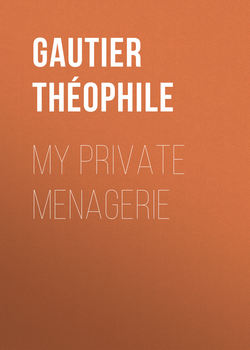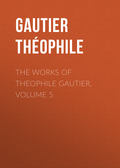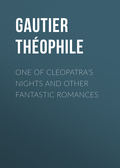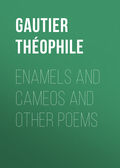I
ANTIQUITY
I have often been caricatured in Turkish dress seated upon cushions, and surrounded by cats so familiar that they did not hesitate to climb upon my shoulders and even upon my head. The caricature is truth slightly exaggerated, and I must own that all my life I have been as fond of animals in general and of cats in particular as any brahmin or old maid. The great Byron always trotted a menagerie round with him, even when travelling, and he caused to be erected, in the park of Newstead Abbey, a monument to his faithful Newfoundland dog Boatswain, with an inscription in verse of his own inditing. I cannot be accused of imitation in the matter of our common liking for dogs, for that love manifested itself in me at an age when I was yet ignorant of the alphabet.
A clever man being at this time engaged in preparing a “History of Animals of Letters,” I jot down these notes in which he may find, so far as my own animals are concerned, trustworthy information.
The earliest remembrance of this sort that I have goes back to the time of my arrival in Paris from Tarbes. I was then three years old, so that it is difficult to credit the statement made by Mirecourt and Vapereau, who affirm that I “proved but an indifferent pupil” in my native town. Home-sickness of a violence that no one would credit a child with being capable of experiencing, fell upon me. I spoke our local dialect only, and people who talked French “were not mine own people.” I would wake in the middle of the night and inquire whether we were not soon to start on our return to our own land.
No dainty tempted me, no toy could amuse me. Drums and trumpets equally failed to relieve my gloom. Among the objects and beings I regretted figured a dog called Cagnotte, whom it had been found impossible to bring with us. His absence told on me to such an extent that one morning, having first chucked out of the window my little tin soldiers, my German village with its painted houses, and my bright red fiddle, I was about to take the same road to return as speedily as possible to Tarbes, the Gascons, and Cagnotte. I was grabbed by the jacket in the nick of time, and Josephine, my nurse, had the happy thought to tell me that Cagnotte, tired of waiting for us, was coming that very day by the stage-coach. Children accept the improbable with artless faith; nothing strikes them as impossible; only, they must not be deceived, for there is no impairing the fixity of a settled idea in their brains. I kept asking, every fifteen minutes, whether Cagnotte had not yet come. To quiet me, Josephine bought on the Pont-Neuf a little dog not unlike the Tarbes specimen. I did not feel sure of its identity, but I was told that travelling changed dogs very much. I was satisfied with the explanation and accepted the Pont-Neuf dog as being the authentic Cagnotte. He was very gentle, very amiable, and very well behaved. He would lick my cheeks, and indeed his tongue was not above licking also the slices of bread and butter cut for my afternoon tea. We lived on the best of terms with each other.
Presently, however, the supposed Cagnotte became sad, troubled, and his movements lost their freedom. He found it difficult to curl himself up, lost his jolly agility, breathed hard and could not eat. One day, while caressing him, I felt a seam that ran down his stomach, which was much swelled and very tight. I called my nurse. She came, took a pair of scissors cut the thread, and Cagnotte, freed of a sort of overcoat made of curled lambskin, in which he had been tricked out by the Pont-Neuf dealers to make him look like a poodle, appeared in all the wretched guise and ugliness of a street cur, a worthless mongrel. He had grown fat, and his scant garment was choking him. Once he was rid of his carapace, he wagged his ears, stretched his limbs, and started romping joyously round the room, caring nothing about being ugly so long as he was comfortable. His appetite returned, and he made up by his moral qualities for his lack of beauty. In Cagnotte’s company I gradually lost, for he was a genuine child of Paris, my remembrance of Tarbes and of the high mountains visible from our windows; I learned French and I also became a thorough-paced Parisian.
The reader is not to suppose that this is a story I have invented for the sole purpose of entertaining him. It is literally true, and proves that the dog-dealers of that day were quite as clever as horse-coupers in the art of making up their animals and taking in purchasers.
After Cagnotte’s death, my liking was rather for cats, on account of their being more sedentary and fonder of the fireplace. I shall not attempt to relate their history in detail. Dynasties of felines, as numerous as the dynasties of Egyptian kings, succeeded each other in our home. Accident, flight, or death accounted for them in turns. They were all beloved and regretted; but life is made up of forgetfulness, and the remembrance of cats passes away like the remembrance of men.
It is a sad thing that the life of these humble friends, of these inferior brethren, should not be proportionate to that of their masters.
I shall do no more than mention an old gray cat that used to side with me against my parents, and bit my mother’s ankles when she scolded me or seemed about to punish me, and come at once to Childebrand, a cat of the Romanticist period. The name suffices to let my reader understand the secret desire I felt to run counter to Boileau, whom I disliked then, but with whom I have since made my peace. It will be remembered that Nicolas says: —
“Oh! ridiculous notion of poet ignorant
Who, of so many heroes, chooses Childebrand!”
It seemed to me that the man was not so ignorant after all, since he had selected a hero no one knew anything of; and, besides, Childebrand struck me as a most long-haired, Merovingian, mediæval, and Gothic name, immeasurably preferable to any Greek name, such as Agamemnon, Achilles, Idomeneus, Ulysses, or others of that sort. These were the ways of our day, so far as the young fellows were concerned, at least: for never, to quote the expression that occurs in the account of Kaulbach’s frescoes on the outer walls of the Pinacothek at Munich, never did the hydra of “wiggery” (perruquinisme) erect its heads more fiercely, and no doubt the Classicists called their cats Hector, Patrocles, or Ajax.
Childebrand was a splendid gutter-cat, short-haired, striped black and tan, like the trunks worn by Saltabadil in “le Roi s’amuse.” His great green eyes with their almond-shaped pupils, and his regular velvet stripes, gave him a distant tigerish look that I liked. “Cats are the tigers of poor devils,” I once wrote. Childebrand enjoyed the honour of entering into some verses of mine, again because I wanted to tease Boileau: —
“Then shall I describe to you that picture by Rembrandt, that pleased me so much; and my cat Childebrand, as is his habit, on my knees resting, and anxiously up at me gazing, shall follow the motions of my finger as in the air it sketches the story to make it clear.”
Childebrand came in well by way of a rime to Rembrandt, for the verses were meant for a Romanticist profession of faith addressed to a friend, since deceased, and in those days as enthusiastic an admirer of Victor Hugo, Sainte-Beuve, and Alfred de Musset as I was.
I am compelled to say of my cats what Don Ruy Gomez de Silva said to Don Carlos, when the latter became impatient at the enumeration of the former’s ancestors, beginning with Don Silvius “who thrice was Consul of Rome,” that is, “I pass over a number, and of the greatest,” and I shall come to Madame-Théophile, a red cat with white breast, pink nose, and blue eyes, so called because she lived with me on a footing of conjugal intimacy. She slept on the foot of my bed, snoozed on the arm of my chair while I was writing, came down to the garden and accompanied me on my walks, sat at meals with me and not infrequently appropriated the morsels on their way from my plate to my mouth.
One day a friend of mine, who was going out of town for a few days, intrusted his parrot to me with the request that I would take care of it during his absence. The bird, feeling strange in my house, had climbed, helping himself with his beak, to the very top of his perch, and looking pretty well bewildered, rolled round his eyes, that resembled the gilt nails on arm-chairs, and wrinkled the whitish membrane that served him for eyelids. Madame-Théophile had never seen a parrot, and she was evidently much puzzled by the strange bird. Motionless as an Egyptian mummy cat in its net-work of bands, she gazed upon it with an air of profound meditation, and put together whatever she had been able to pick up of natural history on the roofs, the yard, and the garden. Her thoughts were reflected in her shifting glance, and I was able to read in it the result of her examination: “It is unmistakably a chicken.”
Having reached this conclusion, she sprang from the table on which she had posted herself to make her investigations, and crouched down in one corner of the room, flat on her stomach, her elbows out, her head low, her muscular backbone on the stretch, like the black panther in Gérome’s painting, watching gazelles on their way to the drinking-place.
The parrot followed her movements with feverish anxiety, fluffing out its feathers, rattling its chain, lifting its foot, and moving its claws, and sharpening its beak upon the edge of its seed-box. Its instinct warned it that an enemy was preparing to attack it.
The eyes of the cat, fixed upon the bird with an intensity that had something of fascination in it, plainly said in a language well understood of the parrot and absolutely intelligible: “Green though it is, that chicken must be good to eat.”
I watched the scene with much interest, prepared to interfere at the proper time. Madame-Théophile had gradually crawled nearer; her pink nose was working, her eyes were half closed, her claws were protruded and then drawn in. She thrilled with anticipation like a gourmet sitting down to enjoy a truffled pullet; she gloated over the thought of the choice and succulent meal she was about to enjoy, and her sensuality was tickled by the idea of the exotic dish that was to be hers.
Suddenly she arched her back like a bow that is being drawn, and a swift leap landed her right on the perch. The parrot, seeing the danger upon him, unexpectedly called out in a deep, sonorous bass voice: “Have you had your breakfast, Jack?”
The words filled the cat with indescribable terror; and she leapt back. The blast of a trumpet, the smash of a pile of crockery, or a pistol-shot fired by her ear would not have dismayed the feline to such an extent. All her ornithological notions were upset.
“And what did you have? – A royal roast,” went on the bird.
The cat’s expression clearly meant: “This is not a bird; it’s a man; it speaks.”
“When of claret I’ve drunk my fill,
The pot-house whirls and is whirling still,”
sang out the bird with a deafening voice, for it had at once perceived that the terror inspired by its speech was its surest means of defence.
The cat looked at me questioningly, and my reply proving unsatisfactory, she sneaked under the bed, and refused to come out for the rest of the day.
Those of my readers who have not been in the habit of having animals to keep them company, and who see in them, as did Descartes, merely machines, will no doubt think I am attributing intentions to the bird and the quadruped, but as a matter of fact, I have merely translated their thoughts into human speech. The next day, Madame-Théophile, having somewhat overcome her fright, made another attempt, and was routed in the same fashion. That was enough for her, and henceforth she remained convinced that the bird was a man.
This dainty and lovely creature adored perfumes. She would go into ecstasies on breathing in the patchouli and vetiver used for Cashmere shawls. She had also a taste for music. Nestling upon a pile of scores, she would listen most attentively and with every mark of satisfaction to the singers who came to perform at the critic’s piano. But high notes made her nervous, and she never failed to close the singer’s mouth with her paw if the lady sang the high A. We used to try the experiment for the fun of the thing, and it never failed once. It was quite impossible to fool my dilettante cat on that note.









